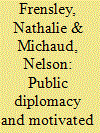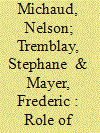| Srl | Item |
| 1 |
ID:
072140


|
|
|
|
|
| Publication |
2006.
|
| Summary/Abstract |
Successful U.S. public diplomacy requires consonance between the actual message and what the audience comprehends. Contending consonance strategies involve initially formulating foreign policy goals and strategies to resonate with audience values or later changing audience values to support formulated goals. At what foreign-policy-making stage will public diplomacy involvement best facilitate message reception? Recognizing overseas presses as mediators in message reception, we analyze whether foreign affairs reporters are Bayesian or motivated reasoning information processors of U.S. foreign policy statements. Our findings support public diplomacy involvement in the policy formulation stage by showing the most frequently recounted sentences from United States president George W. Bush's post-September 11th speeches invoked frames resonating with Canadian national foreign policy values even when controlling for the effects of journalistic practices.
|
|
|
|
|
|
|
|
|
|
|
|
|
|
|
|
| 2 |
ID:
178199


|
|
|
|
|
| Summary/Abstract |
Foreign policy statements—and, namely, white papers—offer diplomats, civil servants, and the general public, as well as international actors (friends and foes alike) an understanding of what motivates a country to engage in international issues. They are fundamental government declarations intended to direct the policy process toward its political and operational objectives. Is history embedded in the message these statements carry? And, if so, how is history used? Relying on Brands and Suri’s typology and framing categories (factual/normative), this article explores white papers issued by governments led by Pierre Elliott Trudeau, Jean Chrétien, Paul Martin Jr., as well as the 2017 House of Commons statement by Justin Trudeau’s foreign affairs minister, Chrystia Freeland. Based on Canada’s tradition of Pearsonian internationalism, we hypothesize that the factual use of history would prevail. We find this to be the case, but with important nuances.
|
|
|
|
|
|
|
|
|
|
|
|
|
|
|
|